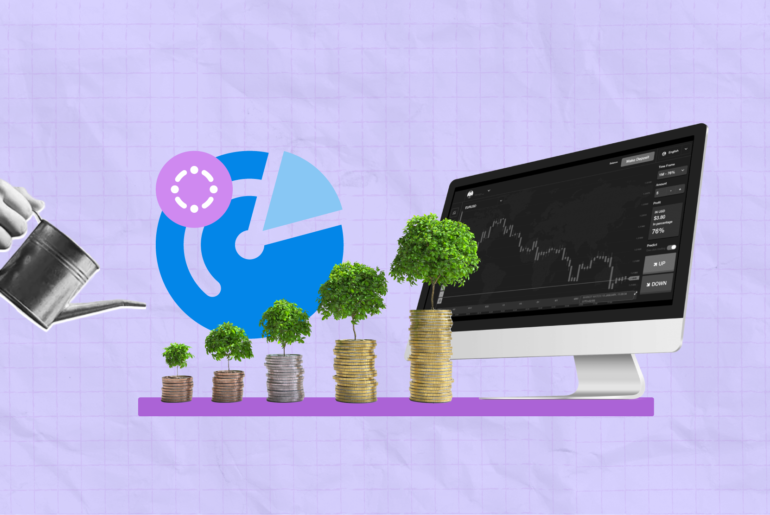Last Updated on Dec 27, 2023 by Anjali Chourasiya
Let’s explore the basics of two major stock exchanges in India: the National Stock Exchange (NSE) and the Bombay Stock Exchange (BSE). The NSE, founded in 1992, is the country’s biggest stock market using electronic trading and the Nifty 50 index. On the other hand, the BSE, dating back to 1875, is the oldest exchange, known for introducing the S&P BSE Sensex in 1986. Both exchanges have similarities but also differ in areas like fees and market size. In this beginner-friendly guide, we’ll break down the distinctions between NSE and BSE to help you understand how they work.
Table of Contents
What is NSE and BSE in the Stock Market?
NSE and BSE are big marketplaces where people trade stocks in India. Both NSE and BSE make it easy for people to buy and sell stocks, helping the stock market work smoothly. People who invest or trade use NSE and BSE a lot, and these exchanges are important for how money moves in India’s financial world.
Understanding the distinctions and similarities between these stock exchanges is crucial for investors and traders alike. So, let’s start by understanding what NSE and BSE are in the share market and then dig into the distinctions between BSE and NSE.
What is NSE?
Short for National Stock Exchange, NSE is the largest stock exchange in India on the basis of market capitalisation. NSE was founded in 1992, and it brought with it the electronic mode of trading in stocks. Headquartered in Mumbai, NSE uses the Nifty 50 index as its benchmark, which comprises the top 50 stocks of the share market across different sectors.
What is BSE?
BSE is an abbreviation for the Bombay Stock Exchange. It is the oldest stock exchange in India, which was founded in 1875. It has earned permanent recognition under the provisions of the Securities Contract (Regulation) Act, 1956. BSE also boasts of being the first stock exchange in Asia and is recognised among the world’s leading stock exchanges. In 1986, BSE introduced the S&P BSE Sensex, which consists of stocks of the top 30 companies listed on the Bombay Stock Exchange.
Similarities between BSE and NSE
Now that you know what BSE and NSE are, here’s a look at their similarities:
- Both these exchanges are popular among investors.
- Both allow stock trading.
- Besides equity, you can trade in bonds, mutual funds and ETFs, commodities, derivatives, futures and options, and currencies on these exchanges.
- BSE and NSE are regulated by the Securities and Exchange Board of India (SEBI).
- Both these exchanges have electronic trading facilities.
- The headquarters of NSE and BSE are both located in Mumbai.
What is the difference between BSE and NSE?
While the points mentioned above capture some similarities between NSE and BSE, these exchanges also exhibit notable differences. Let’s look at the difference between BSE and NSE.
| Points of difference | NSE | BSE |
| Full form | National Stock Exchange | Bombay Stock Exchange |
| Formed in | 1992 | 1875 |
| Benchmark index | Nifty 50 | S&P BSE Sensex |
| Companies in the index | 50 | 30 |
| Companies listed on the exchange | 5,000+ | Around 2,000 |
| Transaction charges | The transaction charges are 0.00335% on turnover (buy & sell) for equity delivery and intraday trades, 0.00195% on turnover for futures, and 0.053% on premium value for options. | The transaction charges are 0.00375% for the turnover value of buy and 0.00275% for the turnover value of buy and sell. |
| Ranking in the world | NSE ranks 8th among the largest stock exchanges in the world. | BSE ranks 10th among the largest stock exchanges in the world. |
| Use of the electronic trading platform | NSE started the electronic trading platform right from its inception in 1992. | BSE incorporated the electronic trading platform called BOLT (BSE On-Line Trading) in 1995. |
| Trading volume | Very high | Lower than NSE |
| Online trading system | Introduced in 1995 | Introduced in 1992 |
| Products traded on the platform | Equity stocks Equity derivatives Currency derivatives Commodity derivatives Mutual funds Exchange-Traded Funds Security Lending & Borrowing Scheme Institutional Placement Program Offer for Sale Corporate Bonds | Equity stocks Equity derivatives Currency derivatives Commodity derivatives Mutual funds Exchange-Traded Funds Offer for Sale Corporate Bonds |
| Liquidity | NSE has higher liquidity as they trade more volume compared to BSE. | BSE offers comparably low liquidity. |
| Market capitalisation | ~ Rs. 334.7 lakh cr. | ~ Rs. 36,422,360.83 cr. |
| Network | The network of NSE is over 1,500 cities. | The network of BSE is 450 cities. |
| Official website address | www.nseindia.com | www.bseindia.com |
How has NSE become more popular than BSE?
Over time, the NSE beat the BSE to become the leading stock exchange in India due to several reasons listed below:
- Technology: NSE’s advanced and reliable technology infrastructure enabled faster and more efficient trading than BSE.
- Products: NSE offered a more comprehensive range of financial products, including derivatives, which attracted more investors and traders.
- Transparency: NSE strongly focused on transparency and disclosure, which instilled investor confidence and helped prevent fraudulent activities.
- Liquidity: NSE was known for higher liquidity levels, which meant more trading activity and higher trading volumes, making it easier for investors to buy and sell securities.
- Efficiency: NSE introduced several measures to increase efficiency, such as market-wide circuit breakers, which helped stabilise the market during times of volatility.
- Regulatory environment: The Securities and Exchange Board of India (SEBI) introduced several measures favouring NSE, such as allowing it to launch new products without prior approval, which helped NSE grow faster than BSE.
Overall, the combination of technology, product range, transparency, liquidity, efficiency, and regulatory environment made NSE the preferred stock exchange in India, increasing its popularity over BSE.
NSE Vs BSE: Which platform to choose as a beginner?
Both NSE and BSE offer trading opportunities in different types of securities. NSE, however, boasts of a large trading volume making it easier for the price discovery mechanism to work effectively. This volume outweighs the limitation of the index containing only a few stocks and can allow better trading opportunities. However, some stocks are listed on the BSE only, so if you wish to invest in such stocks, you would have to trade on the BSE.
You can compare the stocks across both these platforms and then choose one as per your requirements. Alternatively, you can opt for arbitrage trading and buy stock from NSE and sell it in BSE. Moreover, there would be a difference in the price of the same stock on NSE and BSE platforms depending on the stock’s liquidity.
To wrap up
Go through the difference between BSE & NSE before you choose either platform. Understand how these platforms work and then trade in them. Both these exchanges experience market volatility, and so a healthy risk appetite is recommended if you wish to trade in them.
FAQs about NSE and BSE
Which is better, NSE or BSE?
Can I buy in BSE and sell in NSE?
Why is NSE preferred over BSE?
1. Technology: NSE has a more advanced and reliable technology infrastructure than BSE, allowing faster and more efficient trading.
2. Products: NSE offers a wider range of financial products, including derivatives, which attract more investors and traders.
3. Transparency: NSE strongly focuses on transparency and disclosure, which instils investor confidence and helps prevent fraudulent activities.
4. Liquidity: NSE is known for higher liquidity levels, meaning there is more trading activity and higher trading volumes, making it easier for investors to buy and sell securities.
5. Efficiency: NSE has introduced several measures to increase efficiency, such as market-wide circuit breakers, which help stabilise the market during times of volatility.
Overall, the combination of technology, product range, transparency, liquidity, and efficiency makes NSE the preferred stock exchange in India.
Why is the share price different in BSE and NSE?
The price of a stock is determined by the demand and supply of the stock on each exchange. In an efficient market, the price of a stock on one exchange should be similar to that on the other exchange. However, the price discovery mechanism may only sometimes function efficiently, leading to price differences.
These price differences create arbitrage opportunities for traders and investors who can buy shares on one exchange and sell them on the other to make a profit, leading to price convergence. Overall, the price differences in the shares of the same company on NSE and BSE can be attributed to various factors. Still, arbitrage opportunities usually help in reducing the differences over time.
What is the timing of BSE and NSE?
Can a company be listed in both BSE and NSE?
How does a company get listed on BSE or NSE?
- Best Fundamentally Strong Penny Stocks (2024) - Apr 10, 2024
- Best Liquor Stocks in 2024 - Apr 4, 2024
- All Pharma Penny Stocks in India: Pharma Shares Below Rs. 50 - Apr 2, 2024







